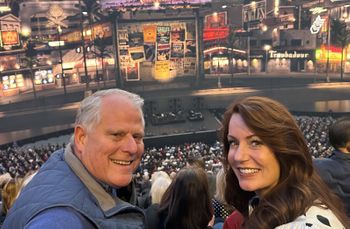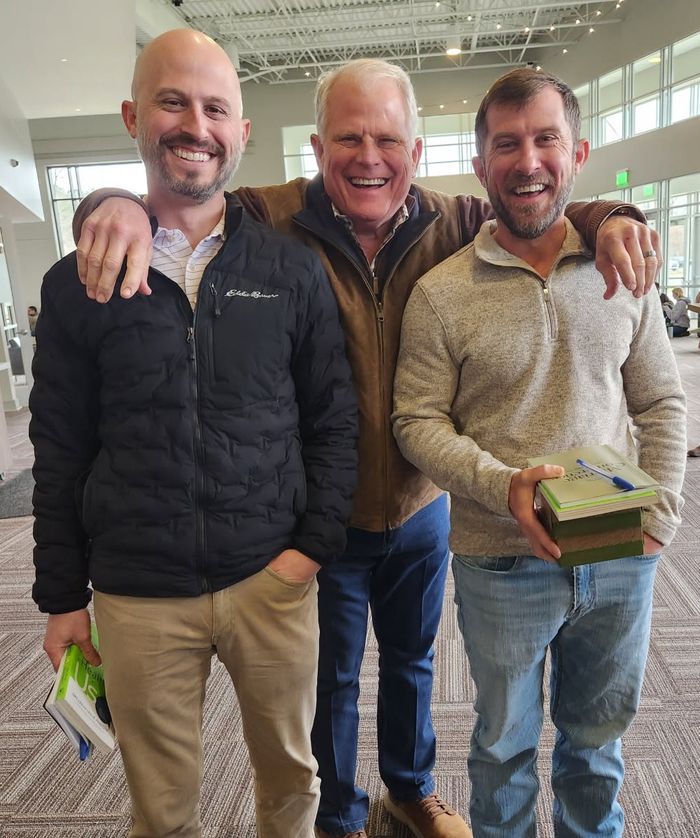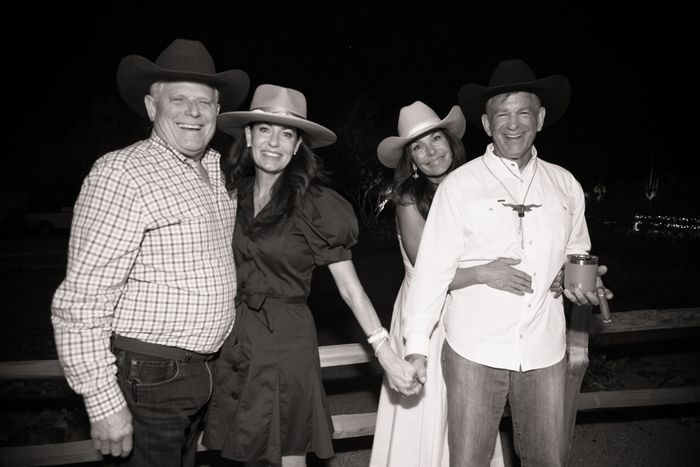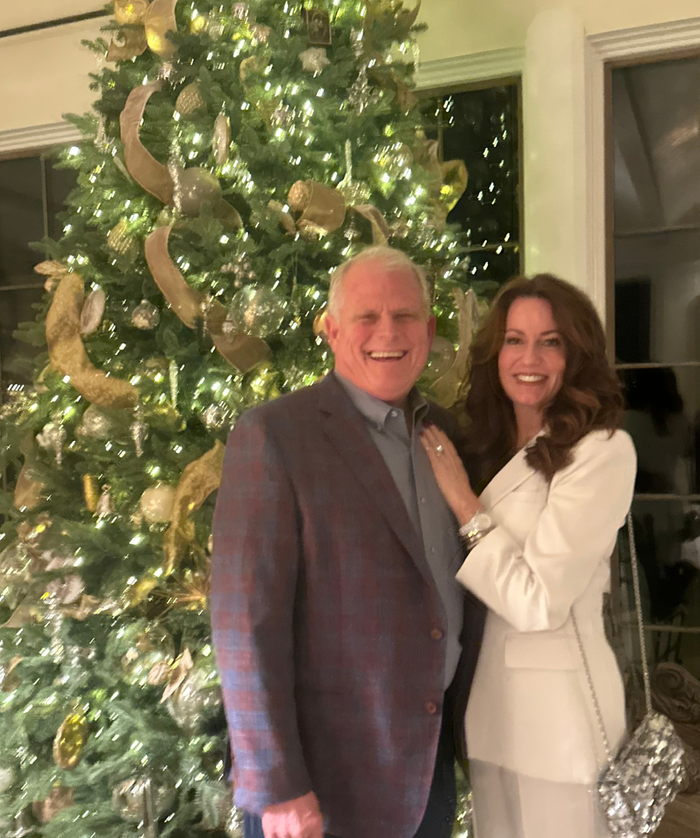A Second Opinion Could Save Your Life

Randy and Julie Rhodes enjoy an Eagles concert
Randy and Julie Rhodes were packed and ready to go. First stop: Providence, Rhode Island to attend their daughter’s graduation from culinary school. From there, a flight out of Boston for a vacation in Barcelona and Paris. But none of those trips were to be.
Randy had not been feeling well in recent months. It wasn’t anything he worried too much about; he just felt tired sometimes—so tired he’d set up a cot in the garage where he keeps antique cars and has an office set up. That way if he was working and got tired, he could just lie down for a quick rest. On the day of the trip, Randy was feeling worse than usual. He was coughing a lot and had stomach pain. But he really wanted to see his daughter graduate, so he packed his bags and hoped for the best.
But in the car on the way to the airport, he looked over at Julie. “I can’t make it,” he said. “I’ll drop you off and head home.” Privately, he wondered if he could even make it home. Instead, he went directly to see his primary physician, a friend he’s known for 40 years.
“You’re going straight to the ER,” said his doctor friend. By that point Randy’s blood pressure was 100/60 and he was having difficulty breathing. He spent the next day at a local hospital hooked up to IVs and feeling awful. “I was coughing a lot and everything hurt—my back, my stomach, my head,” he recalls. “I was so sick and out of it I hardly knew what was going on.”
After the graduation ceremony, Julie came straight home and to the hospital. After seeing her husband and speaking with the hospital staff and doctors, she announced to Randy, “We’re getting you out of here. Things are not moving in the right direction.” With some help from friends at their church, Julie was able to get Randy on an ambulance that day and into a larger and more advanced hospital in the closest big city. At the time, Randy was focused on doing what the doctors told him and trusting he would get better. He later learned that his friends and family were very concerned. “I didn’t know it at the time, but they could see I was seriously sick and they thought I might be dying.”
At the larger hospital, Randy was diagnosed with Non-Hodgkin B-cell lymphoma. The oncologist wanted to put in a port and get started with chemotherapy right away. Randy was too out of it to make difficult decisions; he had been given prednisone and acquired a medical induced psychosis. He doesn’t remember much from those days, but he heard the story later from his family. “Between Julie, my kids, and my brother-in-law, Frank, they all agreed: Let’s slow this down. Maybe get another opinion.” Everyone was concerned that Randy was too weak to tolerate chemo.
Frank Dulcich, who is a Healthnetwork Family Legacy member, had just returned from a business trip in Norway when he got the news about his brother-in-law. He contacted Healthnetwork immediately, and Randy’s case was assigned to medical coordinator Amanda Bise. “When Frank told me about Randy’s situation my mind went immediately to Dr. Iyer at MD Anderson, who has helped so many of our members in the past and is just incredibly brilliant and thorough. I knew if anyone could sort out what was going on with Randy, it was Dr. Iyer,” says Amanda.
“This was all happening on a Thursday,” Randy recalls. “They wanted to put in the port and start chemo the next day. Instead, Frank sent his private plane to pick up Randy and Julie, and they were settled into a room at MD Anderson Cancer Center by Friday afternoon. At first, Randy felt discouraged. “They looked at all my test results and seemed to agree with the diagnosis of lymphoma. They said they would need to repeat a bunch of the blood work and scans. But the hospital sort of quiets down over the weekend, so there we were, sort of stuck and feeling frustrated. But the beauty of that is that I was just sitting there resting all weekend. By Monday morning I was feeling a little better for the first time in two weeks. And some of my blood work looked better.”

Randy and his sons, Christopher and Sean, at a men's night at Randy's church

Randy and Julie Rhodes and Frank and Jill Dulcich

Randy and Julie enjoy the holiday season
The blood work improvements surprised everyone. More tests were ordered. Randy had another PET scan and another biopsy. On Wednesday afternoon, the oncologist spoke with Randy and Julie. “Your blood work is getting back to normal. Your biopsy and PET scan show some spots of concern but no cancer. Why don’t you head home? We’ll get final results in about a week.”
“So it went from, I might be dying to there’s nothing there!” says Randy. A week later, at home, Randy was feeling better by the day. One of the oncologists from MD Anderson called. “I could hear in her voice right away that she did not have bad news and I wondered, How often does she get to do this—deliver good news to someone?”
“Mr. Rhodes,” she said. “We can’t find any signs of cancer.”
Randy still doesn’t have solid answers about what happened and why he got so sick. He does have a theory. Turns out, during those months when he felt exhausted all the time, he’d had mono. Also during that time he’d gotten a bunch of vaccines in preparation for a trip to Ghana and Nigeria. His doctor and long-time friend speculates that Randy’s immune system was worn down from the mono and couldn’t handle the blast of vaccines. But it’s just a theory, and they may never know for sure.
One thing everyone agrees on: Moving to MD Anderson was the right call. “My boys and I went golfing on Father’s Day and they told me, ‘Dad, we knew chemo was going to kill you but we didn’t know how to stop it.’” Randy is so grateful for his family—especially his wife, Julie, who was clear-headed and could make sound decisions when he was too sick to think for himself, and his brother-in-law, Frank, who connected him with Healthnetwork and flew him to Texas.
Frank says, “I believe Healthnetwork and MD Anderson saved Randy’s life.” Randy and Julie agree.
